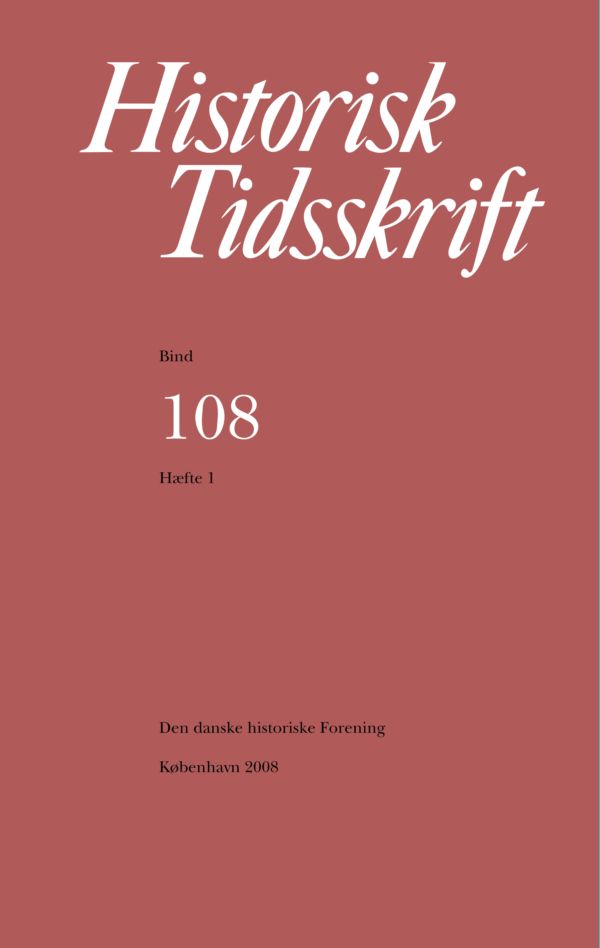En ukendt diplomatisk udveksling mellem Sten Sture og Ivan III. Om Sveriges plads i Habsburgernes russiske diplomati 1488-93
Resumé
An Unknown Diplomatic Exchange between Sten Sture and Ivan III: On Sweden’s place in Habsburg-Russian Diplomacy 1488-93 It has long since been known that there was a “Swedish connection” in the Habsburg-Muscovy diplomatic exchanges that resulted in the conclusion of an anti-Jagiellonian alliance in 1490-91. The imperial envoy Georg von Thurn visited Sweden twice en route from Moscow with the express objective of enlisting the country in the emerging alliance against Poland and obtaining the Swedish crown for the future emperor Maximilian or his son Philip of Burgundy. However, a reading of the Russian sources for the episode, which have largely been ignored by historians, reveals that there was more to the Swedish involvement, and that it had more consequences within Sweden, than hitherto understood. In particular, the discovery of a diplomatic exchange between the Swedish regent Sten Sture and Grand Prince Ivan III of Muscovy sometime in 1490-91 necessitates a reinterpretation of the existing sources.Briefly speaking, during his first visit to Sweden in 1490 von Thurn was asked by the Swedish leadership to intercede with Ivan III concerning ongoing disputes on the common border in Karelia. As a result of von Thurn’s efforts, we must believe, Sten Sture was offered the opportunity to send an envoy directly to Moscow, thus bypassing Novgorod which was Sweden’s normal negotiation and treaty partner, even after its incorporation into Muscovy in 1478. Exceptionally, Ivan III reciprocated the embassy, sending his treasurer to Sweden with the offer of a two-year diplomatic ‘time-out’ (srok) during which to settle outstanding disputes between the two sides. The time-out, which was a usual feature in Russian treaties, would outlast the existing Swedish-Russian peace treaty, due to expire in December 1492, by a year, till Christmas 1493. For final negotiations on the time-out, the Grand Prince referred the Swedes to Novgorod.Accordingly, Sten Sture asked the governor at Viborg in Swedish Karelia, who traditionally ran Sweden’s diplomatic relations with Russia, to send an embassy to Novgorod and settle the matter. However, the governor, in conjunction with other leading persons in Finland, including the Bishop of Åbo, disobeyed the regent and refrained from sending off the embassy, thus initiating a hitherto unknown conflict (among many others) between regent and opposition in the Swedish Council of the Realm. Consequently, Sten Sture had to ask von Thurn, then on the way to his second visit in Moscow in 1491, to petition Ivan III for a postponement of the srok for another six months.The reason for the insubordination of the Finnish leadership was most likely a desire by an influential party in the Council to substitute the age-old security policy vis-à-vis Russia, based as it was on unstable short-term peace treaties, with an anti-Russian defense alliance with Livonia, negotiations for which were actually begun in early 1493. The motive for the shift was both strategic and religious, as Orthodox Russia was largely seen as a stand-in for the Turks in the Catholic crusading rhetoric of the time; and as even the defense of Finland was perceived in crusading terms, not least by the Swedish prelates. Consequently, when Swedish-Russian negotiations began concurrently with the Swedish-Livonian talks, the governor at Viborg once again crossed Sten Sture by concluding exactly the kind of short-term treaty he had so far rejected, despite a Russian offer of a ten-year treaty and Sten Sture’s plea for a long-term peace. This was done to pave the way for the alliance with Livonia. Ironically, later in 1493 the Livonians discontinued the talks with the Swedes to conclude a ten-year peace with the Russians.Downloads
Publiceret
Citation/Eksport
Nummer
Sektion
Licens
Ophavsret til bidrag i Historisk Tidsskrift tilhører forfatterne og Den danske historiske Forening som udgiver af Historisk Tidsskrift. For illustrationer gælder den ophavsret, som står anført i billedteksten. Ophavsretslovens almindelige bestemmelser gælder, hvilket vil sige, at ophavsretten gælder i 70 år efter forfatterens død. Bidrag i Historisk Tidsskrift må derfor, med forbehold for en ”moving wall” på tre år, frit downloades, læses, gemmes, anvendes og citeres (med kildeangivelse) i privat og videnskabelig sammenhæng, men de må ikke helt eller delvis genudgives af tredjepart, heller ikke i redigeret form, uden tilladelse fra forfatterne og Den danske historiske Forening. Henvendelse skal i så fald rettes til Historisk Tidsskrifts redaktion på histtid@hum.ku.dk.





